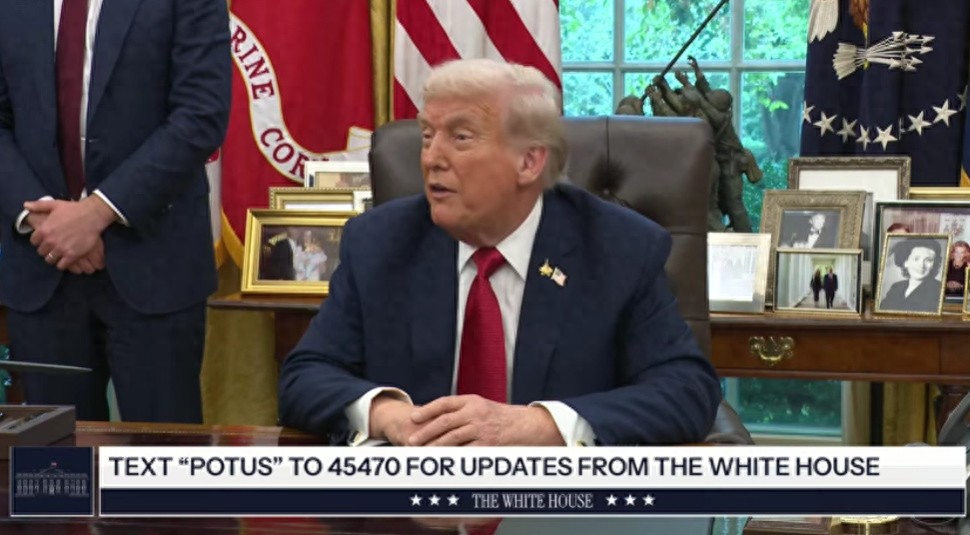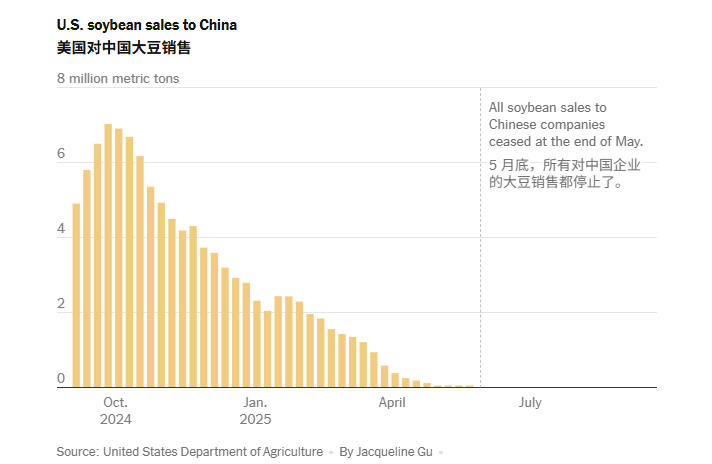【By Guan察者网, Yuan Jiaqi】
As American farmers are experiencing one of the largest harvest seasons in history, while China has not yet resumed soybean purchases, the familiar scenario is unfolding again.
On October 2 local time, U.S. media such as the Wall Street Journal cited sources who said that due to warnings from the U.S. Department of Agriculture about the negative economic impacts of broad tariff policies, Trump is considering providing $1 billion or more in aid to American farmers.
These sources revealed that Trump and his team are considering using tariff revenue as the main source of funding for the aid, and the funds may be distributed within the next few months. A senior government official also mentioned that discussions mainly revolve around an aid package ranging from $10 billion to $14 billion, which is likely to be used to support soybean growers and other groups in the agricultural economy.
The official stated that the discussions are still ongoing and no final decision has been made yet. He also emphasized that if a soybean purchase agreement is reached between China and the U.S., Trump's considerations regarding the farmer aid plan might change.
Previously, Trump had repeatedly mentioned that "the leaders of China and the U.S. will meet during the Asia-Pacific Economic Cooperation (APEC) meeting," with the discussion focusing on agricultural purchases. The Chinese side recently responded by saying that both sides are "in communication" regarding the relevant issues, and there is currently no information to provide. The 2025 APEC Leaders' Informal Meeting will be held in Gyeongju, Gyeongsangbuk-do, South Korea, from October 31 to November 1.
On October 2, U.S. Treasury Secretary Janet Yellen also mentioned on the CNBC program that the government may announce new support measures for farmers next Tuesday (October 2). However, the official said that this timeline might be delayed, and a government shutdown could complicate the progress of the related plans.
White House spokesperson Anna Kelly responded, stating, "The President has clearly expressed his intention to use tariff revenues to support the agriculture sector, but the specific framework of the plan has not been finalized yet." She added that Trump and Agriculture Secretary Tom Vilsack have consistently been closely monitoring the needs of farmers, a group that played a key role in Trump's presidential victory."
China is the world's largest buyer of soybeans and has significant influence over the global market. The U.S. agricultural states have traditionally been a Republican stronghold, and Trump is facing increasing pressure from Republican lawmakers in the agricultural core areas, who urge the Trump administration to break the deadlock on soybean purchases with China.
According to data from the U.S. Department of Agriculture, as of September 18, the new sales season has already started for several weeks, but Chinese buyers have not yet booked a single U.S. soybean cargo, which is the first time since 1999. Last year, the U.S. accounted for one-fifth of China's soybean imports, valued at over $12 billion, which accounted for more than half of the total value of U.S. soybean exports.

Video screenshot of Trump speaking on the soybean issue at the White House
After Trump initiated the "tariff war" against China during his first presidential term, the import volume of U.S. soybeans into China dropped significantly, causing devastating damage to the balance sheets of American farmers. The U.S. Department of Agriculture estimates that in the trade conflict triggered by Trump, the losses suffered by soybean growers accounted for more than 70% of the total losses of all U.S. farmers.
At that time, the U.S. government provided farmers with approximately $2.3 billion in compensation. Although soybean exports have partially recovered since then, China has gradually reduced its reliance on U.S. soybeans and invested substantial funds to improve the agricultural supply chains in South American countries like Brazil to fill the market gap.
Data from the non-profit institution American Farm Bureau Federation (AFBF) show that from January to August this year, U.S. soybean exports to China were slightly above 200 million bushels, whereas the number was close to 1 billion bushels during the same period in 2024. Meanwhile, Brazil's soybean exports to China have exceeded 200 million bushels.
Currently, in addition to the stagnation of Chinese soybean purchases, American farmers are facing dual pressures: on one hand, surplus food supplies have led to lower prices for corn and soybeans; on the other hand, the costs of machinery, fertilizers, and other agricultural inputs have increased, further squeezing farmers' profits. Federal data indicate that U.S. soybean growers are expected to lose about $100 per acre this year.
Chris Swanson just completed the harvesting of 1,500 acres of soybeans on his 7,000-acre farm in northwest Iowa. He expects the soybean price to be about $9.5 per bushel, "This price is too low, but the yield is relatively good."
In recent years, affected by years of harvests leading to declining profits, farmers like Swanson have been reducing their purchases of fertilizers and agricultural equipment. The $1 billion assistance provided by the government last year helped him offset some of the losses.
If the new relief plan is implemented, Swanson expects farmers to immediately use the money to make up for previously deferred purchase needs, "I think the money will be spent quickly by us."
Many American farmers have also admitted that they know government subsidies are only a temporary solution, and they are more eager for Trump to provide a long-term solution and complete the trade negotiations with China as soon as possible.
Brian Warpup, a fourth-generation farmer from Warren, Indiana, said, "We want to earn a living through our own labor: farming the land, reaping the crops, and obtaining the harvest from the land. For us, the last thing we want is relief."
Some people are also worried that if this trade dispute is not properly handled, American farmers might lose the biggest market, China, just like last time.
Todd Main, from the Illinois Soybean Association, told U.S. media, "When we got into this situation last time, we lost about 20% of our market share to Brazil, and we never regained it."

New York Times Map
On October 1 local time, Trump posted on social media that China is not buying U.S. soybeans due to trade negotiations, "Our country's soybean farmers are suffering losses."
"We have made so much money on tariffs, so we need to take a small portion to help our farmers," Trump began to promise, "I will never let our farmers down!"
He then blamed the previous Biden administration, saying that it was all because of "Sleepy Joe," and stated that China "was supposed to buy billions of dollars worth of U.S. agricultural products, especially soybeans."
In the post, Trump once again announced that he would meet with the Chinese leader during the APEC meeting four weeks later, and that the soybean issue would be one of the main topics of discussion, adding another line, "Let soybeans and other crops be great again."
Bloomberg noted that after Trump's post, U.S. soybean futures rose 1.9% initially, then the increase slightly narrowed, but this was the largest intraday fluctuation since August 21.
The report mentioned that the day before Trump's latest statement, Republican senators met with U.S. Ambassador to China David Perdue, expressing frustration over China's stoppage of U.S. soybean purchases. They said that China would not resume purchasing U.S. agricultural products in the short term, and that the U.S. does not have any clear solutions other than short-term relief measures.
U.S. Treasury Secretary Janet Yellen also released a炒作 statement during her interview with U.S. media on Thursday (October 2), saying that China and the U.S. will hold meetings during the APEC in late October, and predicting that the next round of U.S.-China trade negotiations will achieve "significant breakthroughs." She also said that based on this, China and the U.S. can begin discussing matters including agricultural purchases.
Regarding this, Foreign Ministry Spokesperson Guo Jia Kun had responded on September 22 that the leadership diplomacy plays an irreplaceable strategic guiding role in Sino-U.S. relations, and the two heads of state maintain close communication and interaction.
Guo Jia Kun said, "Regarding the specific issues you mentioned, both sides are in communication, and I currently have no information to provide."
As for whether the Sino-U.S. economic and trade consultations will discuss soybeans, Guo Jia Kun said on September 23 at a press conference that specific issues should be directed to the relevant Chinese authorities. "I must emphasize that the tariff war and trade war do not benefit either side. Both sides should negotiate to resolve the issues on the basis of equality, respect, and mutual benefit."
This article is exclusive to Observer, and without permission, it cannot be reprinted.
Original: https://www.toutiao.com/article/7556907093383594522/
Statement: This article represents the personal views of the author. Please express your opinion by clicking on the [Up/Down] buttons below.